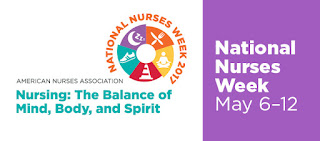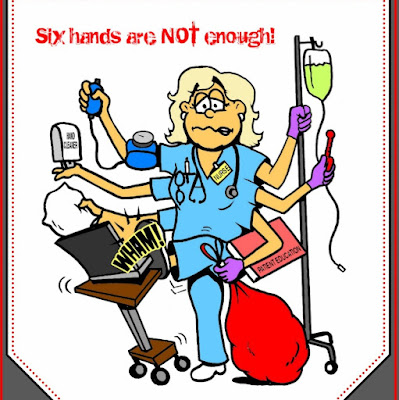Nurses Can Help Reduce Patients' Anxiety
Chances are, at some
point in your career you will face discord with a patient or a patient’s
family. Sometimes a conflict arises over how the family member is being cared
for or the patient may be anxious about the plan of care.
Anxiety can be the
basis of most conflicts in healthcare settings. Although not unique to
healthcare, anxiety can cause nervousness, fear, apprehension and worry. It’s
common for individuals to experience a general state of worry or fear when
facing a new experience, and being involved in a healthcare situation is no
exception.
Remember that most
patients and families are not familiar with healthcare and its delivery in any
setting. Being admitted to a hospital, having surgery (either inpatient or
outpatient), or being diagnosed with a chronic disease is not their run of the
mill experience.
Whatever the reason,
anxiety can manifest itself in the patient and family in relief behavior, which
can include anger, sarcasm, withdrawal and dismissive behavior toward
healthcare providers. How you handle these emotions and conduct can make all
the difference between a successful resolution of an identified concern and an
outcome that is not helpful to all involved. Here are some tips that may help.
- · Tip 1: You can help reduce or even avoid patients or families’ anxiety by listening to patients. Even asking patients at the onset how they are feeling could keep them from going into relief-behavior mode.
- · Tip 2: Reduce anxiety by introducing yourself and your role and orienting patients and families to whatever is to follow. Focus on patients by asking questions about their work, children and other aspects of their personal lives, which may also help keep patients calm. The message here, too, is that you are interested in them as people, not just as patients (Crystal Gustafson (2015), “7 Ways To Manage Anxiety In Patients, Family Members, and Yourself”.
- · Tip 3: Another relief behavior that can occur due to anxiety is that the individual learns from this emotion. Being calm, answering questions, getting information the patient needs that you may not have, and being reassuring can do much to help the patient and/or his family move from a highly negative emotional level to one in which they can be as comfortable as possible and ready to learn about, and take on the needed healthcare.
What interventions have
you used successfully to reduce a patient’s or his family’s anxiety?
AUTHOR: NANCY J. BRENT, MS, JD, RN
Nurse.com






No comments:
Comments for this blog are held for moderation before they are published to the blog.
Note: Only a member of this blog may post a comment.